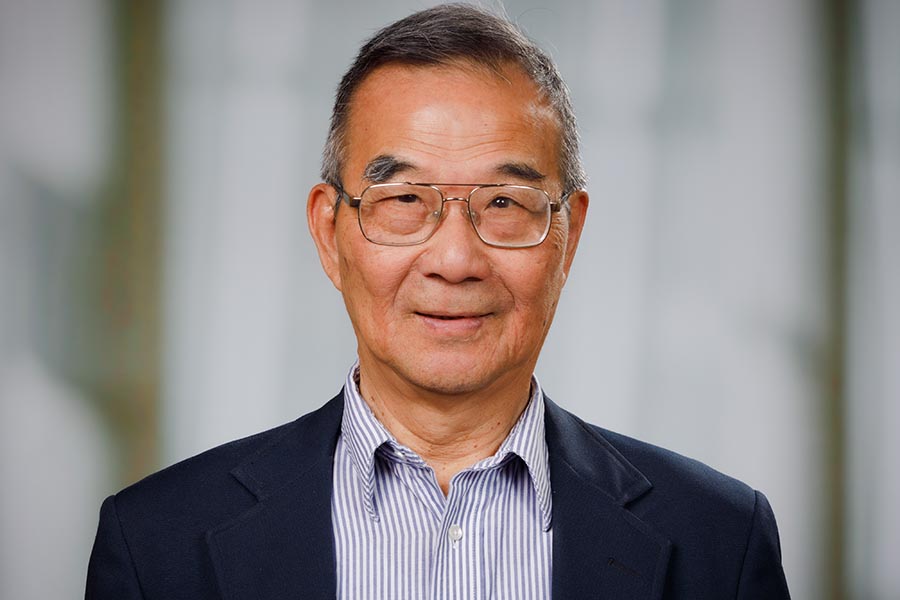Pi-Wan Cheng, PhD

Pi-Wan Cheng, PhD, is a professor in the UNMC Department of Biochemistry and Molecular Biology. Dr. Cheng received his bachelor's degree in agricultural chemistry and master's degree in biochemistry at National Taiwan University.
After receiving his PhD in biochemistry at Case Western Reserve University in 1975, he was promoted to assistant professor in pediatrics in 1977, working on biosynthesis of mucin glycans in airway mucins in patients with airway diseases. He moved to University of North Carolina in 1982 as associate professor in pediatrics.
In 1995, he moved to UNMC as professor of biochemistry and molecular biology. Since then, he has worked on glycan biosynthesis in cancer, specifically the mechanism of altered glycosylation in malignant cancer.
The first breakthrough came in 2014, when Dr. Cheng's group showed that when cancer progresses to malignant stage, loss of giantin function as the major docking site for endoplasmic reticulum-derived transport vesicles leads to loss of core 2 enzyme and shifted Golgi targeting of other enzymes to GM130-GRASP65, the site used by core 1 enzyme in benign cancer under basal condition.
This can explain how tumor-associated carbohydrate antigens are generated in malignant cancers. In 2024, his group discovered that alcohol induces tumor-associated carbohydrate antigens by a mechanism which is very similar to the one used by malignant cancer.
Formation of tumor-associated carbohydrate antigens occurs at low alcohol concentration (30 mM) before Golgi fragmentation happens, which occurs at higher alcohol concentrations (>50 mM). Interestingly, the α2-6sialio mucin O-glycans TACAs kill immune cells mediated by Siglec 7 . This phenomenon can explain how alcohol increases infections and cancer fatalities.
- BS: Agricultural chemistry, National Taiwan University.
- MS: Biochemistry, National Taiwan University.
- PhD, Case Western Reserve University, 1975.
- Agency: NE DHSS-LB506 #29534
- PI: Pi-Wan Cheng
- Title: Development of Siglec 7-based therapy of pancreatic cancer
- Dates: 07/01/24-06/30/25
- Petrosyan A, Ali M, and Cheng P-W. Glycosyltransferase-specific Golgi Targeting Mechanisms. J Biol Chem. 2012: 287, 37621-7. doi:10.1074/jbc.C112.403006.
- Petrosyan A, Holzapfel MS, Muirhead DE and Cheng P-W. Restoration of compact Golgi morphology in advanced prostate cancer enhances susceptibility to galectin 1-induced apoptosis by modifying mucin O-glycan synthesis. Mol Cancer Res 2014: 12, 1704-16. doi:10.1158/1541-7786.
- Cheng P-W, Hothpet V-R, Bhat G, Bailey K, Li L, and Samuelson DR. Alcohol induces α2-6sialo mucin O-glycans that kill U937 macrophages mediated by sialic acid-binding immunoglobulin-like lectin7 (Siglec 7). FEBSopenBio 2024. Doi:10.1002/2211-5463.13919.
- Mechanism of the formation of tumor-associated carbohydrate antigens in human diseases.
- Mechanism of the survival of intracellular virus and bacteria.
- Development of malignant cancer therapy.
- Medical students
- Undergraduate students
- High school students
College of Medicine
University of Nebraska Medical Center
985870 Nebraska Medical Center
Omaha, NE 68198-5870
Lab Contact: 402-559-7718